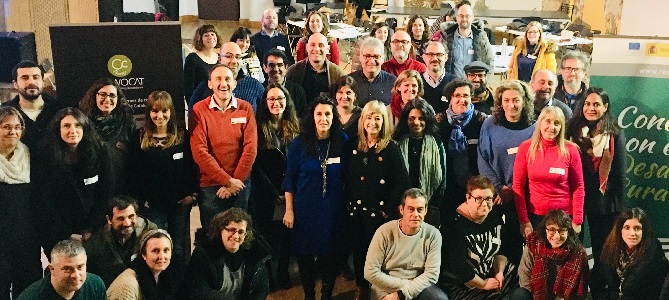
01 de February de 2019
Dinamización rural
On January 31st, the Coworking Conference: An Opportunity for Territorial and Social Development in Rural Areas took place in the municipality of Olot (Girona). More than 40 participants from Catalonia, Madrid, Galicia, and Castile and León, among others, attended the event, representing the interests of Local Action Groups, coworking professionals and freelancers, and many others interested in the topic.
01/31/2019
Rural coworking has been presented as a new, more innovative approach that allows for work that contributes to the economic revitalization of rural areas through its various management methods, offering opportunities tailored to an increasingly autonomous and independent audience seeking to connect the values of the region with their professional and personal goals.
The event was designed as a meeting place for sharing knowledge, learning about best practices and projects from different Spanish regions, presenting opportunities and identifying needs arising in the rural coworking space. The goal was to connect and link professionals from different sectors of activity in rural areas, offering them the visibility and tools they need to network and create synergies among them.
The COWOCAT RURAL project, carried out as part of the aid for the development of cooperation projects of the Local Action Groups of Catalonia within the framework of the RDP 2014-2020, is co-financed by the Department of Agriculture, Livestock, Fisheries and Food (DARP) and the EAFRD, and is promoted by the Consorci Intercomarcal de Iniciatives Socioeconomiciques-Grupo de Acción Local Ribera d'Ebre Terra Alta . In this context, Cowocat_Rural is presented as an innovative project with the aim of promoting economic activity in rural areas through the development of projects and promoting the use of technologies and communications for the creation of employment and economic activity in rural areas, fostering the values of coworking and teleworking. Jaume Bages, coordinator of this project, points out that " Cowocat Rural allows the attraction and retention of qualified human capital in rural areas, being an alternative for growth and development."
Jordi Silvente, president of the Catalan Coworking Association , highlighted coworking as a tool with associated values, which help establish new ways of working that connect space with creativity, talent, multiculturalism , innovation, experience, and diversity. Marc Navarro, a coworking consultant, presented how community is created in the coworking environment. During his presentation, he introduced the speakers who participated in the afternoon roundtable, providing a very graphic illustration of how these synergies are generated between the coworkers themselves and with the region.
Laia Benaiges, from Espai La Magrana, and Martì Batalla, from Palau Cowork in Seu d'Urgell, were some of the speakers who shared their experiences and presented their projects during this event. Marc Planagumà , manager of Nùria Social, the venue for this event organized by the National Rural Network, highlighted the importance of rural areas, of innovation, and of seeking new paths to achieve rural development, with efforts directed toward economic, social, and vital sustainability based on agroecology, the collaborative economy, and a solidarity-based approach.
“Coworking works because it creates connections, energizes spaces, and develops territory.”









